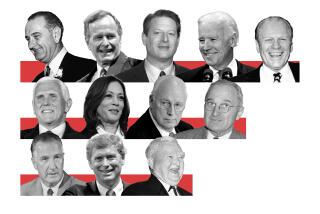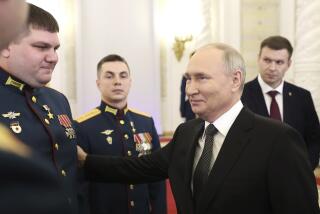An Unlikely Person to Be a Worthy Yeltsin Foe--His Vice President : Russia: Rutskoi has been stripped of power but he is getting even. The Afghanistan war hero may be up to challenging the president.
- Share via
MOSCOW — The two-year political alliance between President Boris N. Yeltsin and Vice President Alexander V. Rutskoi has disintegrated. Follow ing the April referendum, Yelstin stripped Rutskoi of all his remaining jobs and pared his administrative staff to six, from 33. Ironically, the No. 2 man in government is today the most influential man in the opposition and may be on the threshold of a promising--and welcome--political career.
Yeltsin, as if bewitched, continues to repeat the mistakes of Mikhail S. Gorba-chev. Indeed, Rutskoi’s fall from presidential favor resembles Yelstin’s troubles under Gorbachev. Then, as now, thepress began a campaign of harassment against the officially scorned. Then, as now, the victim of the attack has enjoyed increasing popularity.
The alliance between the two men began soon after Yelstin was elected speaker of the Supreme Soviet in June, 1990. Yelstin’s small margin of victory--four votes--greatly restricted his decisions and actions as speaker. To prevail, he had to split the opposition. What he needed was a group of supporters dissatisfied with Ivan K. Polozkov, the Russian Communist Party leader.
Enter Gen. Rutskoi, a decorated hero of the war in Afghanistan. He announced the creation of a new group, Communists for Democracy. Although the group’s membership was small--only 20 of them were from Polozkov’s faction--the psychological effect of its formation was powerful, and it also gave Yeltsin the working majority he needed.
Rutskoi, despite his notoriety and assistance, was not Yelstin’s first choice for vice president. Both Anatoly A. Sobchak, St. Petersburg’s mayor, and Vadim V. Bakatin, a presidential adviser, had turned him down. Only after polls showed that Yeltsin still lacked support in some vast agricultural regions, in the armed forces and among communists--and after his chief opponent, Nikolai I. Ryzhkov, had selected another Afghan war hero, Gen. Boris V. Gromov, as his running mate--did he pick Rutskoi, who was also a member of the Central Committee. Without Rutskoi, Yeltsin would not have received the necessary 50%-plus-one in the first round of voting, although Yeltsin is loathe to admit this today.
But Rutskoi has always been alien to the anti-communist bloc that hoisted Yeltsin to power in 1991. He never meshed with the president’s entourage. As founder of the new Democratic Party of Communists of Russia (called People’s Party Free Russia since August, 1991), he does not share the ideology of the reforms launched by the Yelstin government. When he publicly criticized government leaders --”boys in pink shorts,” as he called them--for the country’s wrenching economic decline, Rutskoi was on his way out of favor. Returning from a trip abroad in December, 1991, he learned that all his powers has been handed over to others.
Yeltsin, defying advisers, rejected an outright break with his vice president, preferring to exile Rutskoi to “the cemetery of political careers”--agriculture. But Rutskoi got even. Credit for the successful harvest of 1992, brought in despite the general collapse of the economy, went to Rutskoi. He also parlayed a brief term as head of an interdepartmental committee on corruption into political prominence by publicizing the abuses of governmental power he uncovered. Yeltsin’s silence and inactivity in the face of corruption became an embarrassment.
Throughout, Rutskoi abstained from criticizing Yeltsin directly, instead blaming the “president’s entourage.” He did this not out of cowardice (he was able to prove his courage many times), but out of common human decency. He hoped that reason would finally persuade Yeltsin to give up on his neo-Bolshevik methods of reforming. But Yelstin, by aggravating the strains between the two men and by cutting off all roads to reconciliation, buried Rutskoi’s hope.
The fall of the alliance can be partly explained by the motives each partner brought to the union. For Yeltsin and his circle, the coupling was strictly tactical, a successful maneuver in their quest for power. For Rutskoi and his comrades-in-arms, who have formed a considerable part of the Civic Union political group, it was strategic, an attempt to create a coalition for the gradual introduction of reforms.
If Rutskoi had not been on Yeltsin’s ticket, his fate would be similar to that of other moderate conservatives--dismissal. This is why the post of vice president is not even mentioned in the presidential draft of the new constitution. Yeltsin, who hasn’t broken most of his old Communist Party habits, picks personnel according to their personal loyalty and has repeatedly urged Rutskoi to resign. Rutskoi says no, arguing that he is not “somebody’s” vice president but vice president of the Russian Federation.
Generals frequently rise to the political top in democratic states. As a rule, this happens during the more difficult moments in a country’s history. In the former Soviet Union, however, no professional military man held the top government seat, although all leaders, from Josef Stalin to Yuri V. Andropov, held high military rank and had full control over the armed forces. The first leaders who had never served in the military were Gorbachev and now Yeltsin.
Yeltsin and Rutskoi were elected at a time when the political world map was colored in a different way. Today, Russia is no longer one of the republics of the Soviet Union but a great world power.
This new reality requires that politicians be judged according to new criteria. The scale and complexity of the problems confronting Russia require not only the selfless efforts of the nation but also of a new generation of politicians.
The political potential of Rutskoi has yet to be revealed. His real political career, judging by many signs, is just beginning. Not long ago, he announced his intention to run for president in the next election. Time will show whether or not he will become yet another figure of the transitional period, or whether the “epoch of Gen. Rutskoi” will go down in history.
More to Read
Sign up for Essential California
The most important California stories and recommendations in your inbox every morning.
You may occasionally receive promotional content from the Los Angeles Times.










